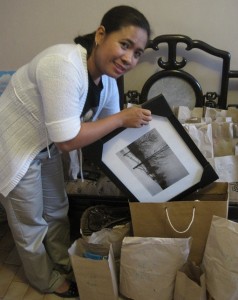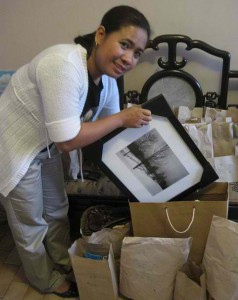By ELIZABETH LOLARGA
 IT’S a most valuable brown bag because it contains offerings that are priceless: love and sacrifice.
IT’S a most valuable brown bag because it contains offerings that are priceless: love and sacrifice.
Brown Bag Auction is one of the activities undertaken by Mentor Philippines, a group of young urban professionals tapped by the Overseas Workers and Welfare Administration to mentor OWWA college scholars, many of them from the provinces to adjust to college life.
The Brown Bag Auction basically starts with solicitation of gift items, ranging from footwear to health and beauty products to accessories, home décor and books. The goods are then placed inside lookalike brown bags with no marks. The bidder in the silent auction has no clue what’s inside, except for the category (e.g., fashion). The opening bid is lower by 50 percent than the item’s actual market price.
Ditas Bermudez, freelance journalist and Mentor volunteer, got the idea of Brown Bag Auction from a friend doing volunteer work in the U.S. She varied the idea because the one in the States had items uniformly priced at $5 each, whatever is inside the bag.
Their first auction was the highlight of “Pasko Pa Rin” project last year where they grossed P25,000 out of the brand-new items they got from newlyweds. The money was used to fund Mentor Philippines’ hospital visits to the Philippine General Hospital pediatrics ward and the activities of mentees like cultural field trips.
The weekend after the auction, mentors and mentees visited two PGH pediatrics wards where there were 50 patients. Mentors Wildee Aggabao and Erin Posadas bought the patients’ food and basic hygiene supplies (powder, alcohol, cologne and cotton). A story-telling session was held.
Apart from visiting 45 sick children, they were able to buy medicines worth P20,000 for a 10-year-old boy who went through heart surgery.
The aim of Mentor Philippines, established in 2007, is to help OWWA scholars have a holistic formation in academic and spiritual aspects, and to open up horizons for them by introducing them to their possibilities.
Being a Mentor volunteer almost sounds like a full-time job, but for Nenette Pauig, a credit review officer at China Bank and Mentor Philippines president, “it’s a refresher for us and the mentees. Since we don’t offer much during a visit to a government hospital ward, many mentors agree that sometimes the best gift you can offer the patients are continued prayers.”
Pauig said more than the goodwill, the PGH visit was a chance “to spend the time with the patients and their parents. We have realized that what they need are listening ears to share their burdens and worries. PGH is strict on visitors so we went by pairs and visited from two to three patients. The usual illnesses are hydrocephalus, leukemia, and meningitis. The others have bouts of pneumonia.”
She added: “It is an eye -opener for them. Although we are supposed to be giving something to the patients, the mentors gain more during the visit. They become more optimistic about their lives, more focused and learn to prioritize the important things rather than getting caught in the daily grind of work.”
Pauig described a typical mentee as one whose parents may be working abroad and has no one to turn to for advice on doing his/her personal budget, on relationships and time management. As of this year, there are 35 active mentees, most of whom are in their university’s or college’s dean’s list, while there are 26 mentors, all professionals in the fields of banking, journalism, chemical engineering, accountancy and teaching.
From activities like the PGH visit, Pauig said she noticed that “most mentees realize the value of family relationship. One mentee said when one is sick, the rest of the family pulls itself together to sacrifice their time and money for the sick loved one. They also learned the value of generosity since they witnessed how we can all help one another not just with the material needs.”
She continued: “We learned to be strong in the face of trials and to be hopeful because we see how patients can be so cheerful, smiling and abandoning themselves to the hands of God.
Mentees learned to value their time since they see how time is precious when one is sick. Many realized that their worries are nothing compared to the patients’. The mentees worry about exams, curriculum loads, appointments and how the patients worry about their life but still survive each day.”
One of their first-quarter activities is the extension of the spirit of Christmas gift-giving through “Pasko Pa Rin,” wherein the volunteers solicited gifts that their family members, friends and friends of friends received during the holiday but find no immediate need or use for. For the donors, giving away new things is a good exercise in detachment or sacrificing for a worthy cause.
The recent auction was held at the Bel-Air Center in Makati where young professionals were meeting in preparation for the World Youth Day celebration in August this year.
Those interested in joining or helping Mentor Philippines can contact Gwenn Tansiongco, vice president for external affairs, at tel. no. 0916-609-8964.
